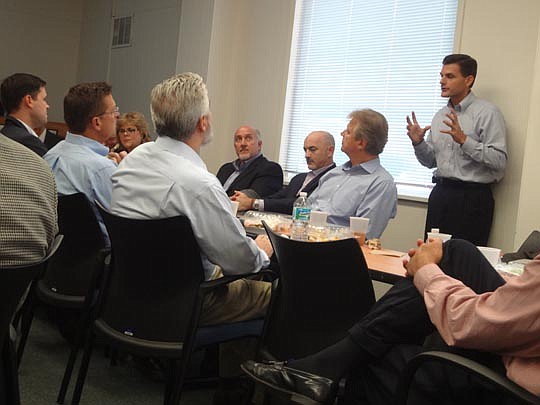
A potential lack of deeper water isn’t the only issue that could hinder business at the Jacksonville Port Authority. A shift in the type of fuel that ships use could leave some clients looking elsewhere — unless Northeast Florida takes the lead in the natural gas industry.
Becoming one of the first to supply liquid natural gas on the East Coast would mean setting a foundation that could attract new clients, but it is costly: likely more than $30 million, mostly in private dollars, just for the fueling facility, according to state Rep. Lake Ray. That doesn’t include the necessary infrastructure needed to transport the product.
JaxPort CEO Brian Taylor told members of the North Florida Logistics Advisory Group that in the short-term, the ability to provide fuel for Sea Star Line’s new ships could be key to keeping the company here. The Jacksonville-based line offers service to Puerto Rico and the U.S. Virgin Islands. It recently signed a letter of intent for two new liquid natural gas ships that are expected to be delivered by the end of 2015.
“We have an obligation now to make sure this port is ready to take care of them,” Taylor told the group.
He said if the port can’t, Sea Star could go elsewhere.
And by 2020, ships will be using the alternative fuel at a 36 percent clip.
The port has partnered with JEA to develop plans to accommodate its customers and Taylor said the determination has to be made which company will supply the fuel, where will it be located and how will it be transported.
The latter two, if housed in Northeast Florida, could provide an economic opportunity Taylor said would allow exports to Central, South and Latin America.
“We have a 100-year supply of natural gas … we can sell that,” he said.
The group’s founder said that Jacksonville has been identified as logical hub.
“Whoever is first is probably going to be the one,” said George Gabel, the group’s founder. “Maybe this is one time we can be first.”
Ray said afterward he will introduce a bill to the Legislature this year to set statewide rules and regulations on natural gas facilities. He said he doesn’t expect much, if any, public dollars devoted to a project.
“It’s got to be private dollars,” he said. “Otherwise we create winners and losers.”
But, he said the private funding and interest is out there.
The conversation spurred out of a presentation by Alan Mosley, RS&H strategic initiatives
engineer, about natural gas and alternative fuels. The North Florida Transportation Planning Organization is developing an alternative fuels master plan, with the Thursday discussion focusing on natural gas.
“If we are going to maintain that ‘America’s Logistics Center’ distinction, then we also should be a center for alternative fuels, and specifically natural gas,” Mosley said.
For transportation services and products, currently 96 percent is fueled by petroleum-based product.
Just 0.2 percent is from natural gas, but that is increasing, Mosley said. Reasons include lower fuel expenses along with advances in natural gas exploration and extraction.
(904) 356-2466